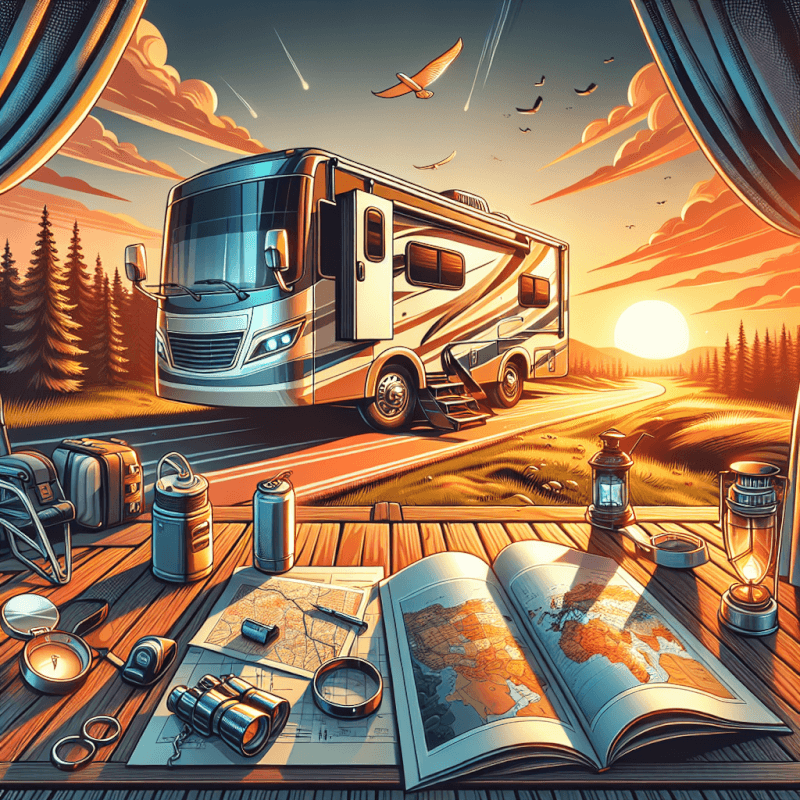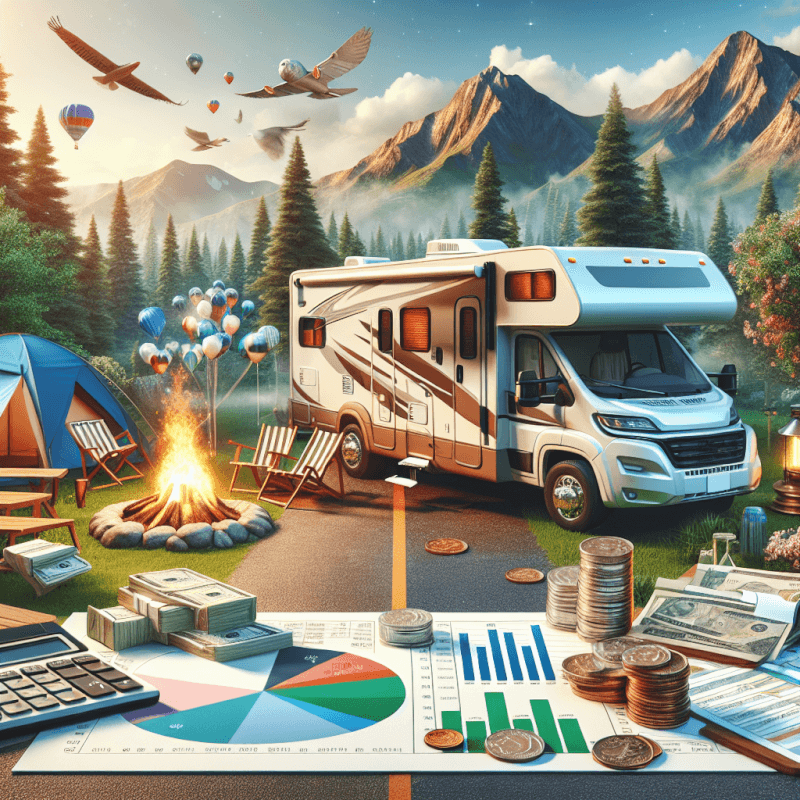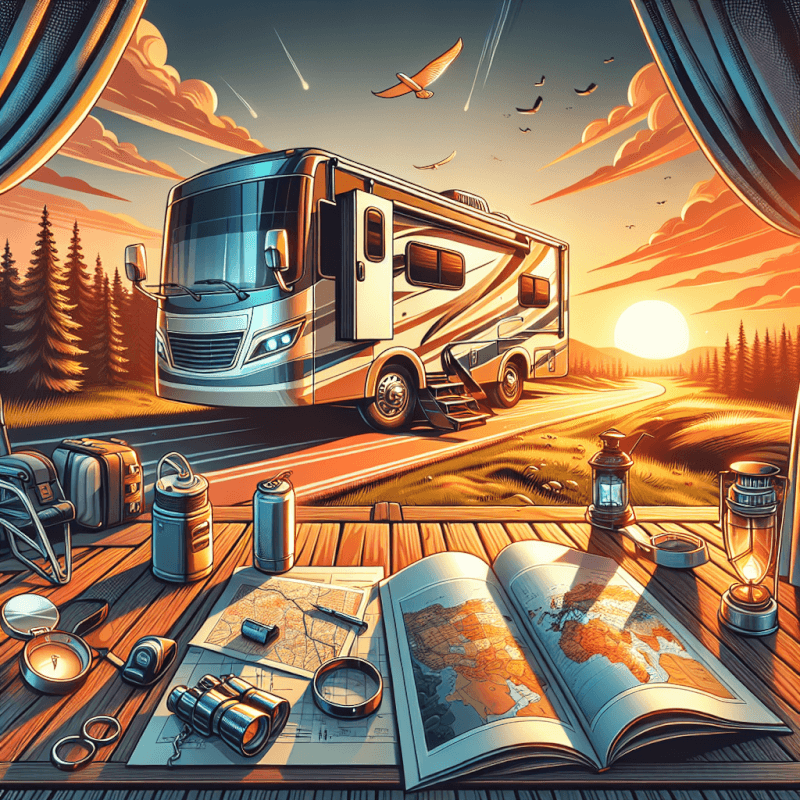Are you dreaming of hitting the open road with your very own RV? Before you embark on this thrilling adventure, it’s important to have a clear understanding of how much you should budget for purchasing an RV. From the cost of the vehicle itself to maintenance, insurance, and campground fees, there are various factors to consider. In this article, we will explore the different aspects of budgeting for an RV purchase, providing you with the information you need to make your dream a reality. So buckle up and let’s navigate the world of RV budgeting together!

Determining Your Budget
When it comes to purchasing an RV, determining your budget is a crucial first step. This will help you set realistic expectations and narrow down your options to find the perfect recreational vehicle for your needs. To establish your budget, you need to consider your finances, evaluate your needs, and research RV prices.
Consider Your Finances
Before diving into the world of RV ownership, it’s essential to assess your financial situation. Take a close look at your income, expenses, and overall financial health. Consider how much you can comfortably afford to spend on an RV without stretching yourself too thin. Remember to account for any existing debts or financial obligations that you’ll need to continue meeting even while owning an RV. By being aware of your financial picture, you can set a budget that aligns with your income and spending capabilities.
Evaluate Your Needs
The next step in determining your budget is evaluating your needs. Think about how you plan to use your RV and what features are essential to you. Are you looking for a compact campervan for weekend getaways, or do you need a spacious motorhome for extended trips? Consider how many people will be using the RV and the amenities you require for a comfortable experience. This evaluation will help you understand the type and size of RV that fits your lifestyle, allowing you to allocate an appropriate budget.
Research RV Prices
Once you have a clear understanding of your finances and needs, it’s time to research RV prices. Explore the market to get a sense of the cost range for different types of RVs, whether you’re interested in Class A motorhomes, travel trailers, or pop-up campers. Conducting thorough research will help you establish a realistic budget based on the current market prices. Keep in mind that prices can vary depending on factors such as the RV’s age, condition, brand, and additional features. By having a solid grasp of the market, you can make informed decisions when it comes to budgeting for your RV purchase.
Cost of RVs
Understanding the cost of RVs is crucial as you navigate the purchasing process. Several factors contribute to the overall price, including whether you choose a new or used RV, the type of RV you select, and various other influencing aspects.
New vs. Used RVs
One of the primary considerations when budgeting for an RV is deciding between purchasing a new or used vehicle. New RVs typically come with a higher price tag, but they often offer the latest features, warranties, and a sense of reliability. On the other hand, used RVs are generally more affordable and can still provide many years of enjoyable camping experiences. Carefully weigh the pros and cons of each option and determine which aligns better with your budget and personal preferences.
Types of RVs
RVs come in various types, each with its unique features and price points. Class A motorhomes, Class B campervans, Class C motorhomes, travel trailers, and fifth wheels are among the most popular options. Class A motorhomes tend to be the most luxurious and spacious, while travel trailers offer greater flexibility and may be more budget-friendly. Consider the size and amenities of each type to understand how they impact the overall cost.
Factors Affecting Pricing
When determining your budget for an RV purchase, it’s important to consider the factors that affect pricing. Age, condition, brand reputation, and additional features are significant influencers on an RV’s price. Newer RVs and those from well-known manufacturers often command higher prices due to perceived quality and reliability. Similarly, RVs with added features, such as advanced technology, upgraded appliances, or luxury finishes, will generally have higher price tags. Understanding these factors will provide you with a better idea of the price range you can expect for the RV type and features you desire.

Purchasing Options
Once you have established your budget and have a sense of the cost of RVs, it’s time to explore different purchasing options. There are three primary avenues to consider: buying from a dealership, private sales, and online marketplaces. Each option offers its advantages and considerations.
Buying from a Dealership
Buying an RV from a dealership can offer several benefits. Dealerships provide a wide variety of new and used RVs, allowing you to compare different models and find the right fit for your budget. Additionally, dealerships often provide warranties, financing options, and professional guidance throughout your buying journey. However, keep in mind that dealership prices tend to be higher due to overhead costs. Negotiating the price and researching the dealership’s reputation can help ensure you’re getting a fair deal.
Private Sales
Purchasing an RV through a private sale can potentially save you money. By buying directly from the owner, you may avoid the additional markups associated with dealerships. Private sales usually involve negotiating directly with the seller, providing an opportunity for cost savings. However, it’s essential to exercise caution when buying privately to avoid scams or purchasing an RV with hidden issues. Carefully inspect the vehicle, review maintenance records, and consider having a professional inspection before finalizing any private sale.
Online Marketplaces
Online marketplaces have become increasingly popular for buying and selling RVs. Platforms such as RVTrader, Craigslist, and Facebook Marketplace offer a wide selection of RVs from both dealerships and private sellers. These online platforms allow you to compare prices, view photos, and read descriptions without leaving your home. However, it’s crucial to exercise caution when buying online and to thoroughly research the seller before committing to a purchase. Arrange to view the RV in person and ask detailed questions to ensure it meets your needs and budget.
Hidden Costs to Consider
When budgeting for your RV purchase, it’s important to account for hidden costs beyond the initial price. Owning an RV involves ongoing expenses such as insurance, maintenance and repairs, as well as fuel and campground fees. By considering these additional costs, you can better anticipate the financial responsibilities of RV ownership.
Insurance
Insuring your RV is a critical consideration to protect your investment. RV insurance typically covers liability, collision, and comprehensive damages, similar to auto insurance. The cost of insurance can vary depending on factors such as the type of RV, its value, your driving record, and the coverage options you choose. Be sure to get quotes from multiple insurance providers and consider factors beyond the premium, such as deductibles and coverage limits.
Maintenance and Repairs
Just like any vehicle, RVs require regular maintenance and occasional repairs. Budgeting for these expenses is crucial to keep your RV in good condition and avoid costly surprises. Routine maintenance costs can include oil changes, tire rotations, brake inspections, and regular servicing of appliances and systems. Additionally, there may be unexpected repairs or part replacements needed throughout your RV ownership journey. Setting aside funds for both preventative maintenance and unexpected repairs will help you stay on top of your RV’s upkeep and ensure its longevity.
Fuel and Campground Fees
Fuel and campground fees are recurring costs associated with RV ownership. Depending on your travel plans and how frequently you use your RV, fuel expenses can vary significantly. RVs are not known for their fuel efficiency, so considering the estimated mileage and fuel prices in your area will help you determine the ongoing fuel costs. Additionally, if you plan to stay at campgrounds or RV parks, you’ll need to budget for nightly fees. Campground fees can range from budget-friendly options to upscale resorts, so consider your desired amenities and location when estimating this cost.

Financing Your RV Purchase
If you’re unable to pay for your RV outright, financing is a common option to consider. Several facets affect the financing process, including loan options, down payments, and interest rates. Understanding these factors will help you make an informed decision and find the most suitable financing solution for your budget.
Loan Options
When financing an RV, you have a variety of loan options available. Banks, credit unions, and RV-specific lenders are common sources for RV loans. Each type of lender offers different terms, interest rates, and loan durations. Comparing multiple loan offers and seeking pre-approval can help you secure the most favorable rates and terms. Don’t forget to factor in any associated loan fees or penalties when budgeting for your RV loan.
Down Payment
Most lenders require a down payment when financing an RV purchase. The down payment amount can significantly impact your loan terms and monthly payments. While the specific down payment percentage varies depending on the lender and your creditworthiness, expect to put down at least 10% to 20% of the RV’s purchase price. Budgeting for a down payment ensures you have the necessary funds available when the time comes to make your purchase.
Interest Rates
Interest rates play a significant role in the total cost of your RV loan. The interest rate you qualify for is dependent on factors such as your credit score, loan term, and the current financial market. Be sure to shop around for the best interest rates and carefully consider how the rate impacts your monthly payments and the overall cost of your RV. Even seemingly small differences in interest rates can add up over the life of the loan, impacting your budget.
Additional Expenses
Beyond the initial purchase price and hidden costs, there are additional expenses to consider when owning an RV. These expenses include upgrades and modifications, RV equipment and accessories, as well as storage costs.
Upgrades and Modifications
Personalizing your RV and making desired upgrades is part of the joy of ownership. However, it’s important to budget for these additional expenses. Whether you desire solar panels, satellite systems, or interior renovations, upgrading your RV can add up. Prioritize your desired upgrades and allocate funds accordingly to avoid overspending.
RV Equipment and Accessories
Alongside upgrades, there is a wide range of essential equipment and accessories to consider when budgeting for your RV. These include items such as leveling blocks, hoses, generators, kitchenware, camping chairs, and awnings. While some items may come with your RV purchase or can be acquired over time, it’s still important to budget for these essentials to ensure a comfortable and enjoyable RV experience.
Storage Costs
If you don’t have the space to store your RV at home, storage costs can be an additional expense to account for. RV storage facilities offer secure parking spaces for your RV, protecting it from the elements and providing convenience when not in use. These facilities typically charge a monthly fee based on the size of your RV and any additional amenities or services offered. Research local options and factor in the cost of storage when determining your RV budget.

Budgeting Tips for RV Ownership
To ensure a successful and enjoyable RV ownership experience, it’s essential to follow some budgeting tips. These tips will help you plan for the future, create an emergency fund, and consider the depreciation of your RV.
Consider Future Expenses
When setting your RV budget, it’s crucial to consider future expenses. Whether it’s a long-distance trip, future maintenance needs, or upgrades you desire down the line, setting aside funds for these anticipated expenses is wise. By incorporating future costs into your budget, you can better prepare for them, preventing any financial strain or surprises along the way.
Create an Emergency Fund
Creating an emergency fund is a smart financial move when owning an RV. An emergency fund acts as a safety net in case unexpected repairs or other financial setbacks occur. Aim to save three to six months’ worth of expenses in an easily accessible account. This fund can provide peace of mind and ensure you’re well-prepared for any unforeseen costs that arise with your RV.
Plan for Depreciation
It’s essential to recognize that RVs, like other vehicles, depreciate over time. While some RVs hold their value better than others, it’s wise to plan for depreciation when budgeting for your purchase. Over time, your RV will likely decrease in value, affecting its resale or trade-in value down the road. By understanding and factoring in depreciation, you can make informed decisions about your RV purchase and long-term financial planning.
Trade-In or Sale Value
Understanding the factors that affect the resale value of your RV can help you plan for future sales or trade-ins. Timing the sale or trade-in appropriately and considering the pros and cons of each option will ensure you get the best value for your RV.
Factors Affecting Resale Value
Multiple factors influence the resale value of an RV. The brand, age, condition, mileage, and demand for the specific model all play a role in determining how much you can sell your RV for in the future. Taking good care of your RV, following recommended maintenance schedules, and keeping detailed records can positively impact its resale value.
Timing the Sale
Timing the sale of your RV can also impact its value. The market for RVs experiences fluctuations, with demand often higher during the spring and summer months. If possible, consider listing your RV for sale when the market is most active. Additionally, selling your RV before any major repairs become necessary can help maximize its value.
Trade-In vs. Selling
When it comes time to part ways with your RV, you have two primary options: trading it in or selling it privately. Trading in your RV to a dealership can be convenient, as it simplifies the process and eliminates the need to find a buyer. However, keep in mind that trade-in values are typically lower than the market value, as dealerships need to account for the costs associated with reselling the RV. Selling privately may require more effort, but it can result in a higher final sale price. Weigh the pros and cons of each option and decide which aligns best with your priorities and budget.

Ways to Save Money
If you’re looking to stretch your RV budget, there are several ways to save money throughout the purchasing and ownership process. Seeking discounts and promotions, buying during the off-season, and joining RV clubs and associations can offer financial benefits.
Seeking Discounts and Promotions
When purchasing an RV, it’s worth exploring any available discounts or promotions. Manufacturers and dealerships often run sales events or offer incentives, such as discounted prices, extended warranties, or free accessories. By researching current promotions and inquiring about available discounts, you may be able to secure a better deal on your RV purchase.
Buying During Off-Season
Buying an RV during the off-season can also contribute to cost savings. Demand for RVs tends to decrease during the winter months, which can translate into lower prices and more negotiation leverage for buyers. However, keep in mind that the selection of available models or features may be limited during the off-season. If you’re flexible with your timing and willing to wait for the right deal, buying during the off-season can be a great way to save money.
Joining RV Clubs and Associations
Joining RV clubs and associations can provide opportunities for discounts and cost savings during your RV ownership journey. Many clubs offer benefits such as discounted campground fees, access to members-only resources, and group-buying discounts on RV supplies and maintenance services. By becoming a member of these communities, you can tap into valuable cost-saving opportunities and connect with like-minded RV enthusiasts.
Conclusion
Determining your budget for purchasing an RV requires careful consideration of your finances, needs, and the various costs associated with RV ownership. By considering factors such as new vs. used RVs, types of RVs, and additional expenses like insurance and maintenance, you can establish a realistic budget that aligns with your lifestyle and financial capabilities. Exploring different purchasing options, understanding loan terms, and budgeting for future repairs and upgrades will ensure a smooth and enjoyable RV ownership experience. With thorough research and careful planning, you can confidently make an informed decision about purchasing an RV that fits your budget and enhances your adventures on the open road.


